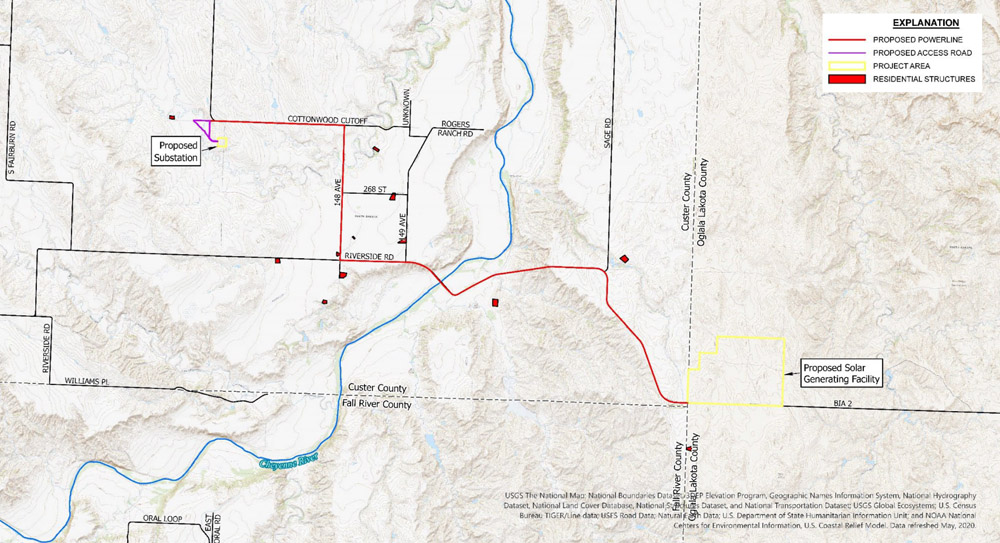FERC last week settled a pair of disputes over waivers from SPP’s generator interconnection procedures (GIP), approving one and denying the other.
The commission reaffirmed Lookout Solar Park’s request for a limited waiver of the GIP’s financial security cure period and posting requirements in responding to SPP’s rehearing request (ER21-1841). However, the agency also denied Invenergy’s request for a prospective waiver from GIP security posting requirements (ER21-2807).
In the first Dec. 1 order, FERC found that the waiver request it granted Lookout Solar earlier this year satisfied the commission’s criteria for granting waivers in that the request did not harm third parties or have undesirable consequences. It clarified that the waiver order extended Lookout Solar’s timeline to either make the applicable financial security payments or withdraw from the generator interconnection queue.
Lookout Solar is developing a 110-MW solar facility in South Dakota and entered the SPP GI queue in 2017. It said in its waiver request that the grid operator posted the results of its definitive interconnection system impact study (DISIS) queue cluster on Oct. 30, 2020, but then reposted revised results on Nov. 20, 2020, triggering a requirement that Lookout Solar post about $16.9 million in financial security.

The developer disputed the revised obligation and said it had reached an agreement via email with SPP that further modified the obligation to $8.1 million. The RTO posted additional study results in April allocating Lookout Solar $181.6 million in upgrades and requiring $28.1 million in financial security. SPP subsequently notified the cluster’s customers that it had identified errors in the DISIS and extended the cluster’s next decision point until May 13.
The solar developer contended that SPP acknowledged that the study “appeared” to over-allocate certain upgrade costs to the facility. It said the RTO did not revise the reposted study results and ultimately told Lookout Solar that no substantive corrections were required.
SPP withdrew Lookout Solar from the queue and asked that it post its financial security amounts to restore its position, leading the developer to file its waiver request. FERC granted the request over SPP’s objections.
Commissioner James Danly concurred separately with the order but expressed his “continuing concern” over the “innumerable” waiver requests FERC grants and reiterated that the commission “must be sparing in its liberality.”
Invenergy Issue not ‘Concrete’
The commission found that Invenergy did not demonstrate that its potential loss of posted financial security “is a concrete problem that warrants waiver” in the second order.
The renewable developer said it had eight interconnection requests pending in the same DISIS queue cluster as Lookout Solar. It alleged that SPP said the DISIS study would need to be redone because higher-queued requests were withdrawn from an earlier cluster. Invenergy said a discussion with SPP staff about the upgrades and assigned cost allocations left its questions unresolved.
Invenergy said that faced with the choice of withdrawing its requests or posting a third financial security to preserve its option to stay in the queue and avoid losing previously paid security amounts, it chose to post security under protest for three of its eight projects.
FERC said Invenergy did not show that its potential loss of its posted financial security was a concrete problem warranting a waiver from SPP’s tariff. It said there was not sufficient detail to demonstrate that an IC customer having to make decisions and provide financial security based on information it views as unsatisfactory warrants granting the waiver.
The commission also said Invenergy’s waiver request is distinguishable from Lookout Solar’s request in that the agency relied on undisputed allegations in the record of SPP’s inconsistent communications and actions.
Commissioner Mark Christie dissented from both orders, saying that after reading the Lookout Solar rehearing order, he could “reach no conclusion other than that today’s [second] order unduly discriminates against Invenergy in an unlawful manner.”
He said there is no “rational basis” for distinguishing between Invenergy and Lookout Solar and said the decision to deny Invenergy’s waiver on “thin factual differences is mystifying.”
“Today the commission relies on semantics to get itself out of the mess it inevitably made by granting the initial waiver in Lookout Solar — the result of which is to put Invenergy (and presumably any subsequent waiver applicants in the cluster) at a patently discriminatory commercial disadvantage to another member of the queue without any rational basis to distinguish the two waiver requests,” Christie wrote.




